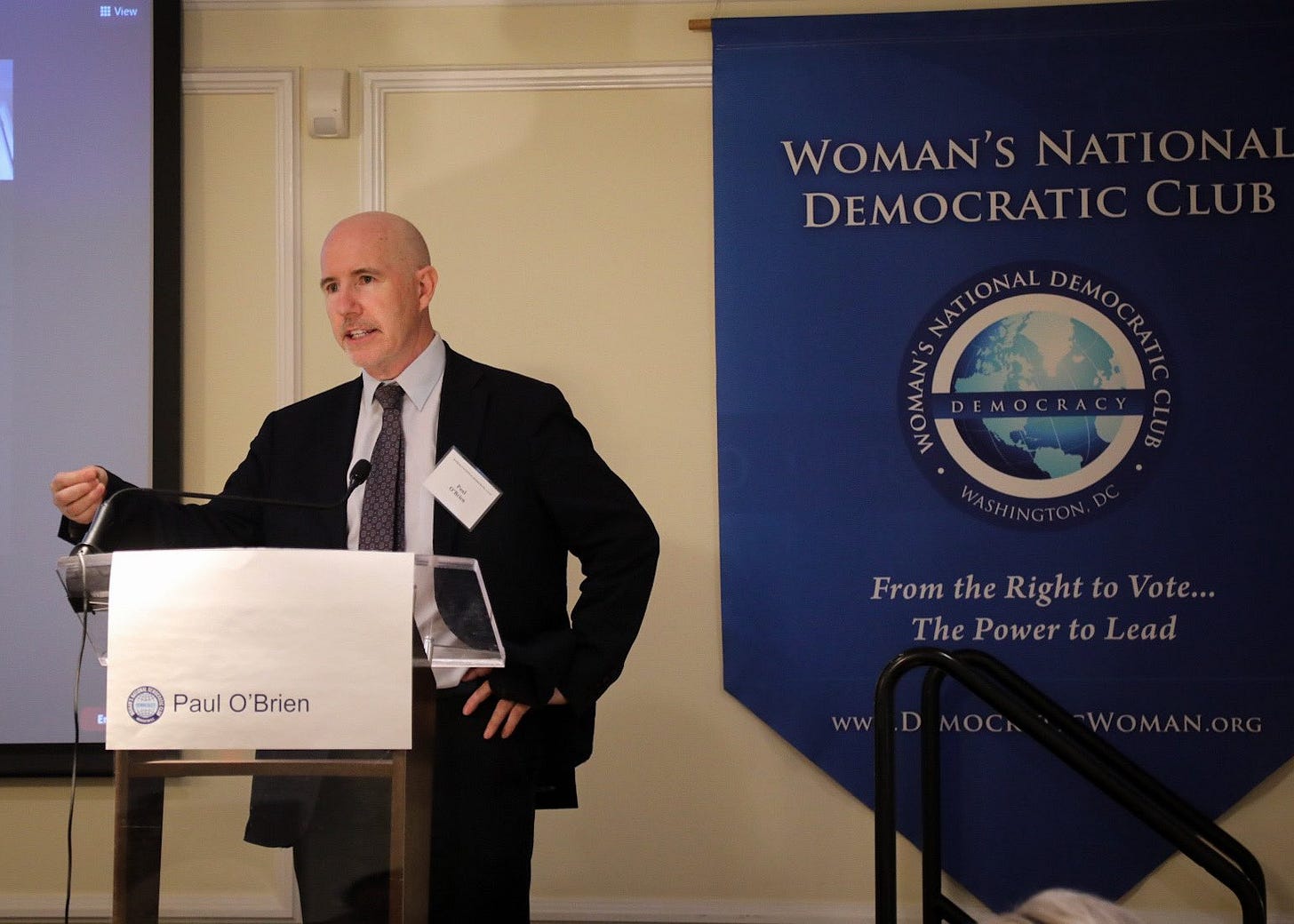Amnesty International blasted after criticizing Israel’s controversial “nation-state” law
But while the law is extreme, it's not some bizarre deviation of the nation-state idea, it's the very embodiment of it. And that's the problem.

Earlier this month, the executive director of Amnesty International USA, Paul O’Brien, came under fire for comments he made at a recent talk he gave on Palestinian rights. Here’s how his remarks were described by Nellie Bowles at Common Sense:
“Amnesty International, which previously declared Israel an apartheid state, has helpfully clarified this week that the organization does not believe in the Jewish state’s right to exist at all.
‘It is not Amnesty’s position, in fact we are opposed to the idea — and this, I think, is an existential part of the debate — that Israel should be preserved as a state for the Jewish people,’ said Amnesty USA head Paul O’Brien in a talk this month with the Woman’s National Democratic Club.
Jewish Insider asked: ‘So Israel shouldn’t exist as a Jewish state, but Israel is a Jewish state.’
And Paul O’Brien again was good and clear: ‘It shouldn’t exist as a Jewish state.’”
As one can well imagine, this led to a general outcry, as well as accusations that Paul O’Brien and Amnesty International are antisemitic. But what exactly does O’Brien mean when he says Israel “shouldn’t exist as a Jewish state”? In reading over his remarks — as well as the media’s reactions to them — it’s obvious that there’s plenty of confusion all around (even if Nellie Bowles thinks things are “good and clear”). Although O’Brien’s comments appear contradictory at times (and we’ll look at that contradiction later), here’s the core of what he said:
“The 2018 law [declares] that the State of Israel is preserved for Jews alone, and it should be theirs alone. And that, from a human rights perspective, is not equal treatment between the Jewish people and the Palestinian people… I think it is incumbent on people who engage this conversation to say, No, I don’t believe that Israel should be preserved as a state in which one race is legally entitled to oppress another. But yes, I understand that the Jewish people have a legitimate concern about their very existence being threatened. And that needs to be part of the conversation.”
So we see O’Brien taking aim at a specific 2018 Israeli law — the controversial “nation-state” law — and saying that it creates unequal conditions between Jews and non-Jews, that it legally entitles Jews to oppress others, that it makes the state “theirs alone.” So what’s this law all about?
After sitting in limbo for seven years, Israel’s nation-state law was finally enacted in 2018 as the country’s 14th “basic law” (the equivalent of a constitutional amendment in the US). When it passed, minority lawmakers in parliament tore the bill into shreds in a fit of rage. Ayman Odeh, the leader of a coalition of primarily Arab parties, said that the Israeli parliament had “passed a law of Jewish supremacy and told us that we will always be second-class citizens.”
On the other hand, lawmakers who voted for it were quick to explain that the law wouldn’t actually infringe on the political rights of minorities, instead it was only meant to preserve Jewish culture. Here’s how then-Prime Minister Benjamin Netanyahu defended the law:
“We will keep ensuring civil rights in Israel’s democracy, but the majority also has rights and the majority decides… An absolute majority wants to ensure our state’s Jewish character for generations to come.”
And most of the law is indeed focused on the state promoting and protecting Jewish cultural, or “national,” identity (the word nation can be confusing — it just refers to any community that shares the same culture, most often ethnic or religious). The law promotes Jewish culture by preserving Jewish heritage throughout the world, consolidating the state’s symbols (its flag, anthem, etc.), determining the state’s calendar of holidays (its official “holy days” — its festivals and days of rest), and enshrining Hebrew as the sole official language (in the process, downgrading Arabic from an official language to “special status”).
That said, some of its clauses are also less clearly about culture. Section 6 protects Jewish people who are under threat because they’re Jewish (presumably this could mean that if two Israelis, one Jewish and one Muslim, attacked each other for religious reasons, the government could go the aid of the Jewish Israeli) and section 7 promotes the act of Jewish settlement, elevating it to a “national value” (for decades Israeli settlements, viewed by the international community as illegal, have moved deeper and deeper into areas in the West Bank and the Golan Heights that are claimed by Palestine and Syria).
But most controversial of all is its core principle: “the right to exercise national self-determination in the State of Israel is unique to the Jewish people.”
One could understand this as simply saying Israel is a state for Jewish people to govern themselves, which doesn’t sound controversial — isn’t that the whole point of Israel? But the controversy surrounds the little word “unique.” This fundamental right is “unique to the Jewish people.” It means that in Israel the act of “self-determination” — of determining one’s own political fate — is ultimately meant for Jews and Jews alone. By making it “unique” to them, all other national-ethnic groups are excluded.
But Israeli lawmakers have assured everyone that the law won’t infringe on people’s political rights. Shortly after the law was passed, Amir Ohana, the chairman of the committee that shepherded the bill into law, declared: “This is the law of all laws. It is the most important law in the history of the State of Israel, which says that everyone has human rights, but national rights in Israel belong only to the Jewish people. That is the founding principle on which the state was established.”
But what exactly does Ohana mean by everyone having “human rights” and only Jewish people having “national rights”?
In the name of promoting and protecting Jewish “national rights” (i.e. Jewish culture), could the government shut down mosques and churches? Could they close Palestinian heritage sites or museums? Could they shutter minority media outlets or shut down minority schools? Israeli Arabs are currently 20% of the population… What if that number began to grow? Obviously, the majority Jewish government have positioned themselves such that they could never allow Arabs to replace them — if they did, what would stop Arabs from striking down the law and replacing it with an Arab or Muslim nation-state law? And so, where the government must already limit the number of minority immigrants, could they also limit the number of minority births? And if they could potentially do all of these things, and more, in the name of Jewish “national rights,” what exactly are the basic “human rights” left to everyone else?

Although proponents of the law would like to pretend it only affects cultural life and that politics and culture are clearly defined and separate, the truth is the exact opposite: it affects both culture and politics because the law joins the two together. And that’s the whole point of the “nation-state” — it takes what was previously two and compounds them into one.
This is a terrible law, but it’s not some sort of bizarre mutation of the nation-state idea, it’s the very embodiment of it. It’s a terrible law because the idea of the nation-state is a terrible idea. Simply put, it’s the idea that every ethnic-cultural group should be able to establish its own political state. This principle of “national self-determination” is one of the cardinal principles of international law, but when you follow it to its logical conclusion it simply falls apart.
On the surface, the idea seems noble: Why should smaller national-ethnic groups be bullied, and possibly absorbed, by their larger neighbors? They obviously shouldn’t, so it would seem right for them to create their own state with their own laws to promote their own culture. This idea was especially championed in 1918 by Woodrow Wilson: “National aspirations must be respected; people may now be dominated and governed only by their own consent.”
The problem is, when a nation creates its own state, there are always other minority national groups within it — it’s nations all the way down. And so it becomes obvious that the very idea of the nation-state is an absurdity. You can never create a nation-state that promotes one national identity without harming all the other ethnic groups that share the same territory. The idea is not a blessing but a curse; you might think you’re creating safety and stability, but in reality you’re only creating the conditions for endless conflict. As Woodrow Wilson’s secretary of state, Robert Lansing, put it: self-determination is “a principle loaded with dynamite.”
And yet we’re almost universally hypnotized by the idea. According to the political scientist Andre Liebich, one reason for this is because, out of the almost 200 nation-states that exist, there are a handful of prominent ones that appear successfully homogeneous (they are “linguistically monolithic” and “display a common set of cultural traits”). But while these are “invoked as models; in fact they are exceptions.”
On the other hand, we don’t notice how the idea perpetuates a kind of ongoing spiritual violence against minorities because most nation-states are much more discreet in pursuing a single national identity, they don’t come out in the open as Israel has done and say “Although we’re naturally a multicultural society, this one culture is the only one we’ll allow to fully self-actualize.” But every nation-state is doing this. Every nation-state favors certain expressions of culture over others. Like Netanyahu in Israel, every nation-state is trying to “ensure our state’s (French or Norwegian or American) character for generations to come.”
National self-determination is, by definition, the act of one culture encoding its values into the vehicle of the state at the expense of all others. It’s the creation of “a state in which one race is legally entitled to oppress another.” It’s an act of cultural supremacy.
And this is where the contradictions in Paul O’Brien’s advocacy become apparent. While he condemns the results of the Israeli nation-state law, like everyone else he’s still in favor of the nation-state idea and the principle of self-determination:
“Does Amnesty believe that the Jewish people have a right to self-determination, which is one of the fundamental human rights? Yes, they do… we don’t take political positions on whether the one-state solution or the two-state solution is better. But the right of the people to self-determination and to be protected is without a doubt, something that we believe in, and I personally believe in.”
So O’Brien is saying that the Jewish people should have the right to national self-determination… but it shouldn’t be unique to them, it shouldn’t be that they alone can create a political state that protects and promotes their national-culture above all others. But what else could self-determination possibly mean?
It is, of course, entirely understandable why one would feel this way about the Jewish people — that they deserve their own state because they, more than any other group, have suffered from the violence of larger neighbors. They have been the minority over and over again. They know what it means to struggle to maintain their identity in the face of ethnic hatred and state oppression. If anyone deserves a homeland free of ethnic strife, it’s them. But unfortunately the nation-state idea won’t bring them peace.
But perhaps, because of their history, the healthy solution can also emerge from them, the recognition that the cycle of cultural supremacy has to stop or else safety will always be a vanishing dream.
Because coupling the state to any one culture will only perpetuate violence. Instead we need to take the apparatus of the state away from all nations — separate nation and state completely, which just means separate politics and culture completely, disband the failed and terrible project of welding the two together.
We know that nations can survive on their own. There are thousands of nations (ethnic groups, religious groups, and language groups) that are stateless, and yet their language and traditions endure. Now it’s time to show the world that states, too, can survive on their own. It’s very possible this is the only way they can survive, by taking seriously their mandate of establishing fair and impartial laws, by treating all citizens as equals, by blinding themselves to all cultural differences.
Many people will rightly worry that this will lead to further segregation, that each ethnic group will simply retreat into its own culture and customs. Many will ask, If we don’t even try to meld the different groups together, why would they talk to each other at all? Won’t it just be constant disinterest and neglect?
And many have tried to create a national identity less connected to ethnicity and more connected to the state — a shared patriotism born of political ideals, a “civic nationalism.” And there is truth to this. It’s just that we don’t need to elevate or erase any ethnic identity in the process. We can simply let nations be nations — let everyone pursue their own individual cultural development — and, instead of creating a shared national identity, create a shared political identity, what we could call “civic egalitarianism.”
Because in culture we’re all different but in democracy we’re all the same, we’re all equals. A robust experience of egalitarianism, of equality, could arise if culturally-diverse citizens actually met across the table to decide their common rights. This would be the promise of democracy made real.
And it’s this that can replace the imposed and shaky unity of the nation-state and instead provide real security. It’s this that can bind together all Israeli citizens, as well as all French citizens, all American citizens. It will not be an easy road to walk, but it’s the only road that will lead every individual, regardless of their culture, to a homeland where they can stand united with all others, even those who look, think, and act differently than they do.
POSTSCRIPT: Since publishing this article, the question has been asked whether there are any historical examples of nation-less states. The US, at its founding, is one example — the colonists didn’t share the same culture, often not even the same language, so the state was created first and then the nation came into existence over time (this is why Jill Lepore has called America a State-Nation instead of a Nation-State). The diversity of American colonists — their distinctly different cultures and languages, and how those differences still impact us today — has been well documented in Colin Woodard’s American Nations.
In addition, there are a number of multinational, or “plurinational,” states around the world — Switzerland and Belgium being two examples — where there’s not one dominant national culture, but many, each with their own language. This shows that there is some flexibility in how nation-states have been created… Now we just need to get to the point of separating nation from the state entirely.






Nice overview and yes, a great opportunity for the cultural-political-economic distinction.
Might be worth noting that it's not just the political that trumps the cultural all the time, it's the economic that controls the political. In the US "business" is still fighting the New Deal, and it has been quite comfortable with the cultivation of a white-supremacist "alt-right" in order to shore up a "conservative" party which, as the Senator from Florida recently affirmed, wants to destroy not just Obamacare but Medicare and Social Security. Why? Because crony/selfish capitalism depends on inequalities to make "opportunities" for the "free" (unrestrained) marketers. [Yes, jamming a few points together there.] So... does Israel have an economic sector? What's it up to?
There's a good book for the Anglo background from which, unintended, independent Israeli statehood emerged:
'The cool, aloof Balfour was anything but an Old Testament character himself. But of all the Englishmen who at one time or another helped along the Return he was possibly the only one interested in it from the point of view of the Jews. To him they were neither tools of the Christian millennium nor agents of a business imperialism, but simply exiles who should be given back, in payment of Christianity’s “immeasurable debt,” their homeland. Not just any land, but the old land. Why Palestine? “The answer is,” he wrote, “that the position of the Jews is unique. For them race, religion and country are inter-related as they are inter-related in the case of no other religion and no other country on earth.' [Tuchman, Barbara W.. Bible and Sword (p. 339). Random House]
Thank you Seth. As an Israeli I can tell you that this is very inspiring. The light of threefolding is shinning bright and clear, and I feel that there is significance just in seeing a clear vision, just in feeling it as a comprehensive answer, even if the situation today seems so far from all this - there is still power in the very feeling, which is similar to the feeling of finding an answer to a complicated and confusing riddle.
I love, as well, the way you start from what may look like a "regular" political opinion, but then slowly move into a meta-political sphere - a sphere from which, I believe, real answers come.